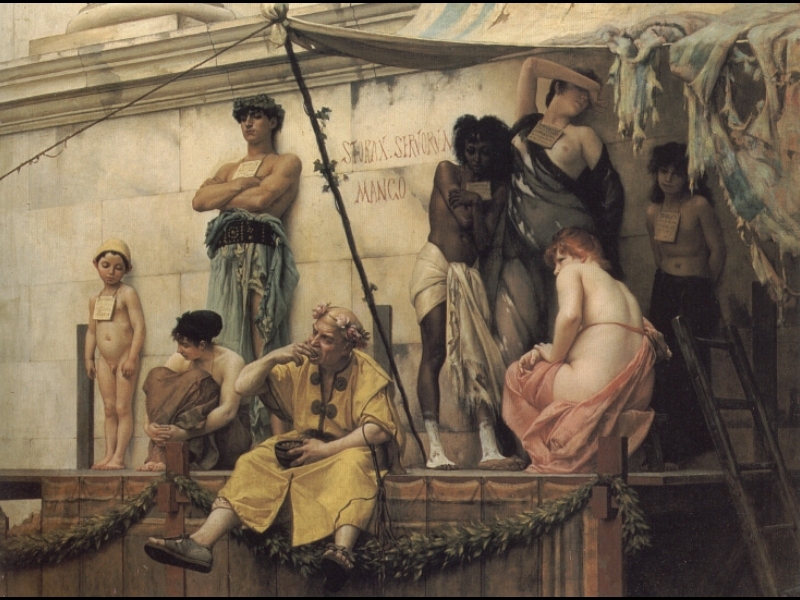Slavery
(New page: '''Rome, Its Rise and Fall By Philip Van Ness Myers'''Copyright, 1900, 1901, "Economic Causes. — Among the various economic causes of the fall of Rome must be placed the institution of...) |
|||
| (One intermediate revision by one user not shown) | |||
| Line 1: | Line 1: | ||
| − | '''Rome, Its Rise and Fall By Philip Van Ness Myers'''Copyright, 1900, 1901, | + | [[Image:slavemarket.jpg|right]] |
| + | |||
| + | '''Rome, Its Rise and Fall By Philip Van Ness Myers''' Copyright, 1900, 1901, | ||
"Economic Causes. — Among the various economic causes of the fall of Rome must be placed the institution of slavery. It is indeed true that before the end of the empire the hard lot of the slave had been greatly bettered by the influences of the stoical philosophy and of Christianity, and that in wide districts of the empire the system had been transformed, or was being transformed, into the milder servitude of serfdom. But notwithstanding these changes in the system, it was still, as in the later days of the republic, the source of many of the evils that afflicted society. It prevented the normal increase of population. It degraded labor, and thus made impossible the development of a healthy industrial life. It also reacted disastrously upon the morals of both master and slave, indurating the feelings of the one, and destroying the manhood of the other. In all these ways the slave system tended to undermine the very foundations of the state." | "Economic Causes. — Among the various economic causes of the fall of Rome must be placed the institution of slavery. It is indeed true that before the end of the empire the hard lot of the slave had been greatly bettered by the influences of the stoical philosophy and of Christianity, and that in wide districts of the empire the system had been transformed, or was being transformed, into the milder servitude of serfdom. But notwithstanding these changes in the system, it was still, as in the later days of the republic, the source of many of the evils that afflicted society. It prevented the normal increase of population. It degraded labor, and thus made impossible the development of a healthy industrial life. It also reacted disastrously upon the morals of both master and slave, indurating the feelings of the one, and destroying the manhood of the other. In all these ways the slave system tended to undermine the very foundations of the state." | ||
[[Category:Decline and Fall]] | [[Category:Decline and Fall]] | ||
Latest revision as of 16:00, 27 May 2009
Rome, Its Rise and Fall By Philip Van Ness Myers Copyright, 1900, 1901,
"Economic Causes. — Among the various economic causes of the fall of Rome must be placed the institution of slavery. It is indeed true that before the end of the empire the hard lot of the slave had been greatly bettered by the influences of the stoical philosophy and of Christianity, and that in wide districts of the empire the system had been transformed, or was being transformed, into the milder servitude of serfdom. But notwithstanding these changes in the system, it was still, as in the later days of the republic, the source of many of the evils that afflicted society. It prevented the normal increase of population. It degraded labor, and thus made impossible the development of a healthy industrial life. It also reacted disastrously upon the morals of both master and slave, indurating the feelings of the one, and destroying the manhood of the other. In all these ways the slave system tended to undermine the very foundations of the state."
